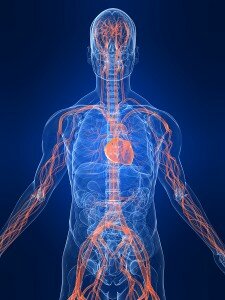 If you want to improve your overall health, and the health of your loved ones, then you need to understand the relationship between nitric oxide and cardiovascular health. It’s absolutely critical because you could not live without nitric oxide – the master signaling molecule of your entire cardiovascular system.
If you want to improve your overall health, and the health of your loved ones, then you need to understand the relationship between nitric oxide and cardiovascular health. It’s absolutely critical because you could not live without nitric oxide – the master signaling molecule of your entire cardiovascular system.
You’ve most likely never been counseled by your physician about the importance of nitric oxide and cardiovascular health. Yet there is an overwhelming amount of research that validates the tremendous role nitric oxide plays in your body. Here is just a sample of several prominent physicians and researchers with their comments about nitric oxide and cardiovascular health:
Dr. John Cooke – Director of Vascular Medicine at Stanford University and author of the book, The Cardiovascular Cure:
“This book will introduce you to the magic that is inside your blood vessels. It comes in the shape of a molecule, one of the simplest molecules found in nature. This molecule is nitric oxide, or NO, a substance so powerful that it can actually protect you from heart attack and stroke. Best of all, your body can make it on its own. NO is your body’s own built-in, natural protection against heart disease.”
Dr. Louis J. Ignarro – 1998 Nobel Laureate in Medicine and author of the book, NO More Heart Disease:
“Though NO’s structure is simple, nitric oxide is now regarded as the most significant molecule in the body, absolutely crucial to your well-being. I am convinced that nitric oxide can age-proof your cardiovascular system, keeping it much fitter than your chronological age would indicate.”
“Repairing the damage wrought by cardiovascular disease without risky and often ineffective surgery had long been considered impossible. I was awarded the Nobel Prize in Medicine for making that thinking obsolete. Now we know we can reverse cardiovascular impairment naturally – with the body’s internally manufactured ‘wonder drug,’ nitric oxide.”
Dr. Jonathan S. Stamler – Professor of Medicine at Duke University Medical Center:
“It does everything, everywhere. You cannot name a major cellular response or physiological effect in which [nitric oxide] is not implicated today. It’s involved in complex behavioral changes in the brain, airway relaxation, beating of the heart, dilation of blood vessels, regulation of intestinal movement, function of blood cells, the immune system, even how fingers and arms move.”
Three of the most prominent doctors in America all talking about the importance of nitric oxide and cardiovascular health. How this amazing molecule plays such a significant role in your overall health. The production of nitric oxide is a vital function of your endothelium, which lines all of your cardiovascular system. In fact, the 1998 Nobel Prize in Medicine was awarded to three American researchers who discovered how the endothelial cells produce nitric oxide from the amino acid L-Arginine. Since its discovery much has been learned about nitric oxide. For example:
- Nitric oxide regulates the muscle tone of blood vessels to have a major impact on controlling blood pressure.
- Nitric oxide stops blood platelet cells from grouping together in a clot to help prevent blockages in the blood vessels.
- Nitric oxide controls the action of almost every orifice from swallowing to defecation.
- Nitric oxide helps the immune system fight viral, bacterial and parasitic infections as well as tumors.
- Nitric oxide causes penile erections by dilating blood vessels to help in erectile dysfunction.
- Nitric oxide transmits messages between nerve cells.
- Nitric oxide seems to be associated with the process of learning, memory, sleeping, feeling pain, and maybe even depression.
- Nitric oxide has been shown to be a mediator in inflammation and rheumatism.
- Nitric oxide promotes vascular reparative mechanisms when injury occurs. It is one of the keys to reversing atherosclerosis.
To help you understand the significance of nitric oxide and cardiovascular health, let’s focus on two key cardiovascular issues.
Nitric Oxide and Cardiovascular Health – High Blood Pressure!
According to the Centers for Disease Control and Prevention, 31.3 percent of the U.S. adult population has high blood pressure. That represents almost one out of every three adults. Add to this fact that another 25 percent of American adults have prehypertension – blood pressure numbers that are higher than normal, but not yet in the high blood pressure range – and you have over half the American adult population affected by this cardiovascular disease.
This represents a staggering cost in human life and a significant financial drain. In 2006, high blood pressure was listed as the primary or contributing cause of death for 326,000 Americans. The estimated cost in 2010 for health care services, medications, and missed days of work was $76.6 billion.
The typical treatment program for most people with high blood pressure can be a combination of diet, exercise, stress management techniques, and medication. For many who opt for the medication route, it’s estimated that 26 percent still do not have their hypertension under control. Since many medications also have some form of side effect it can be a frustrating journey trying to get your blood pressure under control.
Enhancing the body’s ability to produce nitric oxide is seldom considered yet Nobel Prize Laureate in Medicine Dr. Louis Ignarro makes the following statement regarding nitric oxide and cardiovascular health:
“More effective than any other factor in the body, nitric oxide can dilate the smooth muscle of the blood vessels. With this dilation, the vessels can relax and allow blood to flow easily through them – and quite possibly lower the blood pressure.”
Nitric oxide is the body’s most powerful vasodilator and causes the smooth muscle of the vascular wall to relax. This regulates your blood pressure and the health of your endothelium controls this process. Properly nourishing and repairing your endothelium so that it can properly produce nitric oxide is a natural way to help maintain normal blood pressure.
Nitric Oxide and Cardiovascular Health – Strokes and Heart Attacks!
When you have a blood clot that causes a blockage in the brain we call it a stroke and when that blockage occurs in the heart it’s called a heart attack. According to the American Heart Association’s website 87 percent of all strokes are ischemic strokes. An ischemic stroke occurs when a blood clot forms in the bloodstream. This blood clot then lodges within an artery of the brain causing a blockage. This blockage reduces the necessary blood flow to that section of the brain leading to damage or death to those brain cells. The amount of damage determines the severity of the stroke. This same scenario applies to your heart. Add to this the following statistics:
- 77% of Americans treated for a first stroke had high blood pressure!
- 69% of Americans who experienced a first heart attack had high blood pressure!
As you can see the prevention of strokes and heart attacks really centers on addressing high blood pressure and reducing the potential for the formation of blood clots. Your body does this naturally through nitric oxide – the master signaling molecule of your entire cardiovascular system. Nitric oxide causes two very specific events or reactions to occur.
Nitric oxide keeps blood platelet cells from sticking together. This helps to prevent blood clots from occurring in the vascular system, thereby reducing the risk for strokes and heart attacks.
Nitric oxide is your body’s most powerful vasodilator to relax the smooth muscle of your vascular wall to properly control blood pressure. This improves blood flow and directly addresses the number one risk factor for strokes and heart attacks. Additionally, your endothelium is a critical component in the regulation of your blood pressure by controlling the response of your vascular wall to the changing pressures within your cardiovascular system.
Nitric Oxide and Cardiovascular Health – Conclusion!
While there is much more that can be said about nitric oxide and cardiovascular health it is very evident that many of the cardiovascular issues facing the American population could be addressed through the proper production of nitric oxide.
Learning how to properly nourish, heal, and support your endothelium through proper nutritional supplementation, diet, and exercise would be a much more cost effective and life enhancing way then the current approach taken today. As stated at the beginning of this article, nitric oxide is critical to your cardiovascular health.
Together we can work to save a million lives!
Dan Hammer
Dan Hammer has a background in biology, chemistry, and exercise physiology. He used to run one of the largest health club operations in the Chicago area and has been helping people with their wellness issues for more than 25 years.
The information contained in this article is for general information purposes only and never as a substitute for professional medical advice or medical exam. The information about nitric oxide and cardiovascular health has not been evaluated by the Food and Drug Administration and should not be used to diagnose, treat, cure or prevent any disease without the supervision of a qualified medical doctor.

